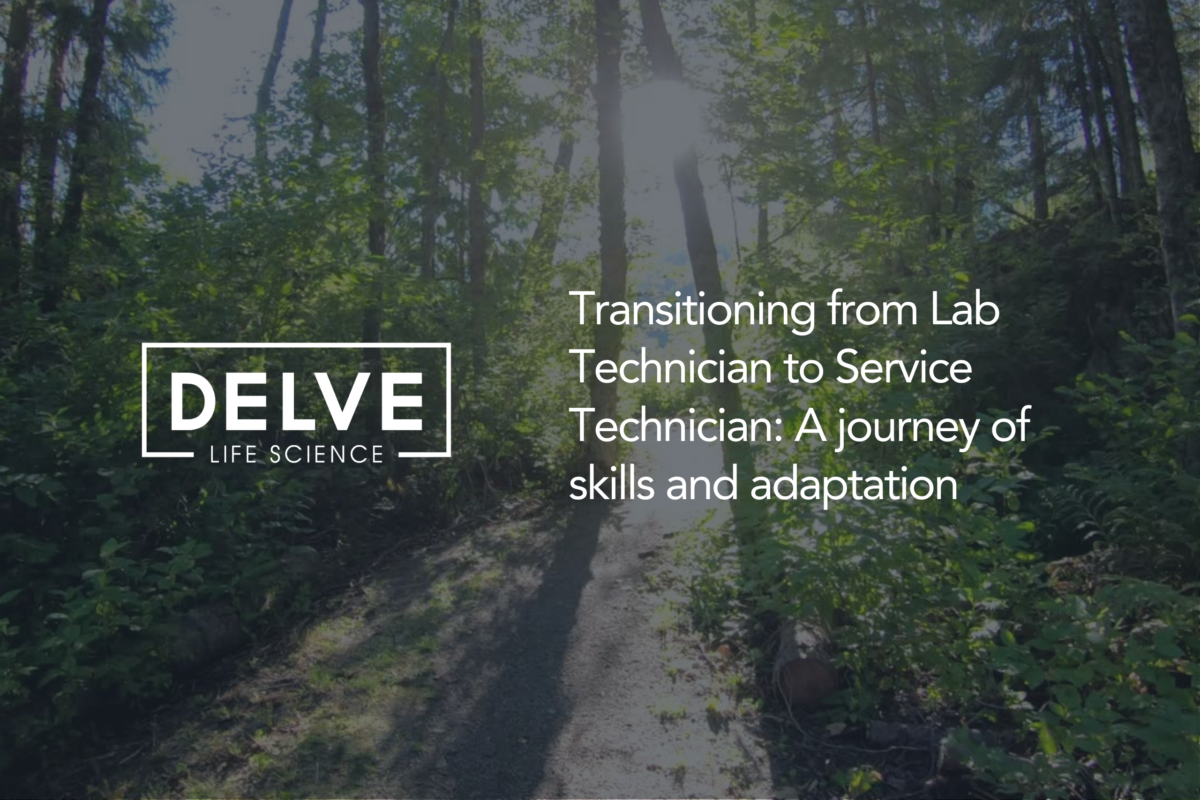
Transitioning from Lab Technician to Service Technician: A Journey of Skills and Adaptation
By Jamie Rafferty
In the dynamic landscape of scientific careers, transitions between roles are not uncommon. One such transition that is discussed as much as others is the move from a lab technician or research position to a service technician. While these positions may seem worlds apart at first glance, they share common threads of technical expertise, problem-solving skills, and a dedication to precision. Let’s explore this transition journey and the skills that enable individuals to thrive in both roles.
The leap of transition
Moving from a lab technician or research position to a service technician role often involves a significant shift in focus and responsibilities. In the lab, technicians are immersed in the intricacies of experiments, data analysis, and laboratory protocols. Their days are filled with tasks like sample preparation, equipment maintenance, and collaborating with researchers on experiments. On the other hand, service technicians are the frontline responders, tasked with installing, maintaining, and repairing scientific instruments and equipment at various customer sites.
The leap from the controlled environment of a laboratory to the unpredictable terrain of field service requires adaptability and a willingness to learn new skills. It’s not just about fixing equipment anymore; it’s about understanding customer needs, troubleshooting complex issues and providing timely solutions while maintaining a high level of professionalism.
Bridging skills and expertise
Despite the apparent differences between lab and service technician roles, there are key skills and expertise that seamlessly transfer between them.
- Technical proficiency: Lab technicians possess a strong foundation in scientific principles, instrumentation and experimental techniques. This technical expertise serves as a solid foundation for understanding the intricacies of scientific instruments in the field. Whether it’s a spectrophotometer or a chromatography system, the ability to comprehend instrument functionality and diagnose technical issues is invaluable.
- Problem solving skills: Both lab and service technicians are adept problem solvers. In the lab, they troubleshoot experiments gone awry or equipment malfunctions. Similarly, service technicians tackle a diverse array of technical challenges in the field, ranging from hardware failures to software glitches. The ability to approach problems methodically, identify root causes, and implement effective solutions is a shared skill that transcends job titles.
- Communication and customer service: While lab technicians may primarily interact with fellow researchers, service technicians engage directly with customers. Effective communication skills are paramount in understanding customer concerns, explaining technical concepts in layman’s terms, and building rapport. Transitioning from behind-the-scenes support to client-facing interactions requires a shift in mindset, but the ability to empathise and communicate clearly remains a constant.
- Attention to detail and precision: Whether pipetting microliters of a sample in the lab or calibrating instrumentation in the field, precision is non-negotiable. Both roles demand meticulous attention to detail to ensure accuracy and reliability in results. Lab technicians are accustomed to following protocols with precision, while service technicians apply this same rigor when performing equipment installations, preventative maintenance and troubleshooting tasks.
Embracing the transition
Transitioning from a lab technician or research position to a service technician role is not without its challenges. It requires humility to embrace a beginner’s mindset, resilience to navigate unfamiliar territory, and a proactive approach to skill development. Seeking mentorship from experienced service technicians, pursuing relevant training programs, and leveraging online resources can facilitate a smooth transition.
Moreover, recognising the broader impact of one’s work can be a motivating factor. While lab technicians contribute to scientific discoveries within the confines of the laboratory, service technicians play a crucial role in ensuring the reliability and functionality of scientific instrumentation beyond the lab walls. Their efforts directly impact research outcomes, clinical diagnoses, and industrial processes, making a tangible difference in various fields.
Get started on your journey
Embarking on the journey from a lab technician to a service technician is an exciting adventure that blends your technical skills with new challenges and opportunities for growth. If you’re ready to leverage your scientific expertise in a dynamic, customer-facing role, now is the perfect time to make the transition. Embrace the change, enhance your skill set, and join the frontline of scientific innovation.
Ready to take the leap? Start your journey today and transform your career as a service technician. Your next step begins now!
Reach out to Jamie;
Call: +44 (0)1606 212020
Email: jamie.rafferty@delverec.com
LinkedIn: Jamie Rafferty
Share This Blog
Recent Articles

Technical vs. Leadership career paths

The hidden engine of Germany’s innovation: Why the future of engineering relies on a proactive approach

Networking Tips for Semiconductor Professionals in Europe

Key workforce challenges in the Advanced Engineering sector

Breaking into the Semiconductor Industry: Tips for engineering graduates






